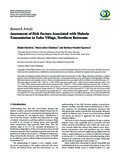Please use this identifier to cite or link to this item:
http://hdl.handle.net/10311/1456Full metadata record
| DC Field | Value | Language |
|---|---|---|
| dc.contributor.author | Chirebvu, Elijah | - |
| dc.contributor.author | Chimbari, Moses John | - |
| dc.contributor.author | Ngwenya, Barbara Ntombi | - |
| dc.date.accessioned | 2016-07-14T13:15:27Z | - |
| dc.date.available | 2016-07-14T13:15:27Z | - |
| dc.date.issued | 2014-03-16 | - |
| dc.identifier.citation | Chirebvu, E. et.al (2014) Assessment of risk factors associated with malaria transmission in Tubu Village, Northern Botswana, Malaria Research and Treatment, Vol. 2014, 10 pages | en_US |
| dc.identifier.issn | 2044-4362 (Online) | - |
| dc.identifier.issn | 2090-8075 (Print) | - |
| dc.identifier.uri | http://hdl.handle.net/10311/1456 | - |
| dc.description.abstract | This study investigated potential risk factors associated with malaria transmission in Tubu village, Okavango subdistrict, a malaria endemic area in northern Botswana. Data was derived from a census questionnaire survey, participatory rural appraisal workshop, field observations, and mosquito surveys. History of malaria episodes was associated with several factors: household income (P < 0.05), late outdoor activities (OR = 7.016; CI = 1.786-27.559), time spent outdoors (P = 0.051), travel outside study area (OR = 2.70; CI = 1.004-7.260), nonpossession of insecticide treated nets (OR = 0.892; CI = 0.797-0.998), hut/house structure (OR = 11.781; CI = 3.868-35.885), and homestead location from water bodies (P < 0.05). No associations were established between history of malaria episodes and the following factors: being a farmer (P > 0.05) and number of nets possessed (P > 0.05). Eave size was not associated with mosquito bites (P > 0.05), frequency of mosquito bites (P > 0.05), and time of mosquito bites (P > 0.05). Possession of nets was very high (94.7%). Close proximity of a health facility and low vegetation cover were added advantages. Some of the identified risk factors are important for developing effective control and elimination strategies involving the community, with limited resources. | en_US |
| dc.description.sponsorship | This work was supported by the International Development Research Centre (IDRC), Canada (Grant no. 106024-001). | en_US |
| dc.language.iso | en | en_US |
| dc.publisher | Hindawi Publishing Corporation, http://www.hindawi.com/journals/mrt/ | en_US |
| dc.rights | This is an open access article distributed under the Creative Commons Attribution License, which permits unrestricted use, distribution, and reproduction in any medium, provided the original work is properly cited. | en_US |
| dc.subject | Malaria | en_US |
| dc.subject | malaria Tranmission | en_US |
| dc.subject | Okavango Delta | en_US |
| dc.subject | Tubu Village | en_US |
| dc.subject | mosquito | en_US |
| dc.title | Assessment of risk factors associated with malaria transmission in Tubu Village, Northern Botswana | en_US |
| dc.type | Published Article | en_US |
| dc.rights.holder | The authors | en_US |
| dc.link | http://dx.doi.org/10.1155/2014/403069 | en_US |
| Appears in Collections: | Research articles (ORI) | |
Files in This Item:
| File | Description | Size | Format | |
|---|---|---|---|---|
| Chirebvu_MRT_2014.pdf | Main Article | 1.39 MB | Adobe PDF |  View/Open |
Items in DSpace are protected by copyright, with all rights reserved, unless otherwise indicated.
